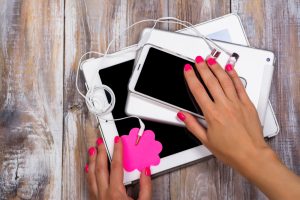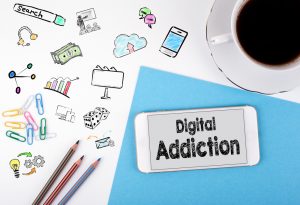Recently I was planning a night out with a friend, and there was a movie I was keen to see. When I suggested it, my friend said, “would you mind if we did something else, Rach, as I have been sat in front of a screen for nearly 10 hours today!”
So, Instead, we found a fab place to eat and decided to have a good old catch up. As we stood waiting to be seated at our table, we both checked our phone messages.
Finishing first, my friend then checked her Instagram and Whatsapp.
 We spend our lives in front of screens; the digital alarm clock we wake up with, the laptops we sit in front of at work, the tablets and phones we use as we travel on the tube, train or plane, the Sat Nav we navigate by and the TV we flop in front of at night… Phew!
We spend our lives in front of screens; the digital alarm clock we wake up with, the laptops we sit in front of at work, the tablets and phones we use as we travel on the tube, train or plane, the Sat Nav we navigate by and the TV we flop in front of at night… Phew!
Useful yes; though I can’t help thinking… is this what life is about now; being plugged in 24/7?
Here’s a few facts that shocked me from a recent book I read on how to break up with your phone!
- The average person checks their phone 200 times a day – that’s once every six and a half minutes.
- 73% of Brits say they’d struggle to go a day without checking their phone or computer.
- One in four people spend more time online than they do asleep.
- 70% of 16-24-year-olds say they prefer texting to talking.
- The average teenager sends 3,400 electronic messages a month from their bed.
While I love the convenience technology brings to our lives, I am increasingly aware of our growing addiction to all things tech.
Being passionate about wellbeing I wanted to explore what impact technology is having on our health, so in this and the next post, I am going to share more about the consequences of tech addition, what a digital detox is, and how to start your own personal ‘detox.’
What Impact Is Technology Having On Our Health?
 Research by the British Psychological Society found that smartphone use causes people to become anxious and check compulsively for alerts and messages.
Research by the British Psychological Society found that smartphone use causes people to become anxious and check compulsively for alerts and messages.
In 2017, Instagram was rated as the worst social media platform for its impact on the mental health of young people.
Here’s one I can relate to; how many of us have started using glasses after several years of working with PC‘s for many hours in the day. Maybe you suffer from a new generation of repetitive strain type injuries such as; text neck, and iPad elbow without realising that frustrating ache or pain you have is a ‘medical condition.’
Doing my research for this post I came across the quote below. It’s a sobering thought.
“Just as neurons that fire together wire together, neurons that don’t fire together don’t wire together. As the time we spend scanning web pages crowds out the time we spend reading books, circuits that support those old intellectual functions and pursuits weaken and begin to break apart.”-
Nicholas Carr, The Shallows: What the Internet Is Doing To Our Brains
 I don’t know about you, I feel it’s time to take action. So how do we begin to get some perspective and learn to manage how we use technology and our devices in a more balanced and healthy way?
I don’t know about you, I feel it’s time to take action. So how do we begin to get some perspective and learn to manage how we use technology and our devices in a more balanced and healthy way?
In my next post, I’m going to explore this further.
Thanks,
Rachel Hewitt-Hall
About Excel Communications
Excel Communications has a 30+ year history as a global leadership and communication skills organisation dedicated to exceeding the expectations of clients through the training and development of their business and people.
We have a team of expert trainers delivering programmes across four continents in multiple languages. Isn’t it time you got in touch? Call us now on +44 (0) 1628 488 854.